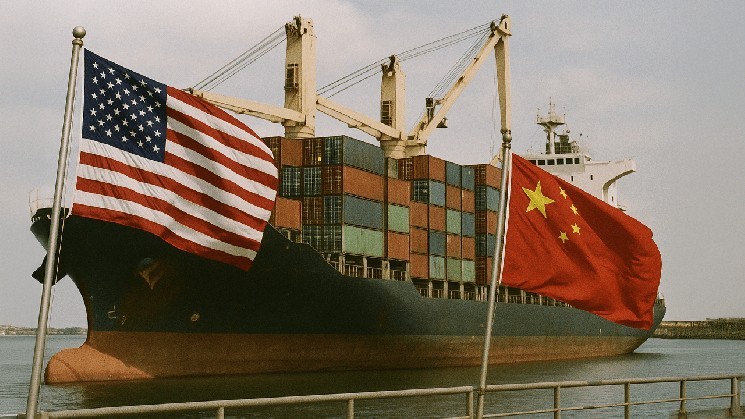Web3 experts emphasize that the ongoing trade war, while presenting challenges, can also act as a catalyst for innovation within the blockchain space. However, they argue that fostering a mindset of global unity can help mitigate the divisive effects of trade wars.
Decentralized Governance Can Mitigate Disputes Caused by Protectionist Policies
As the U.S.-China trade war intensifies, exposing the challenges of unilateral action in a globally connected economy, blockchain and Web3 experts advocate for a different strategy. DWF Labs Managing Partner Andrei Grachev argues that decentralized technologies provide key insights for navigating complex international conflicts.
“Trade tensions involve reciprocal actions, like tariff responses, complicating matters,” Grachev states. He emphasizes the interconnected nature of modern trade disputes, where one nation’s actions often trigger retaliatory measures.
The DWF Labs executive’s remarks came just as the U.S. sharply escalated its tit-for-tat tariff war, reportedly imposing an additional 100% tariff on Chinese imports. This latest measure effectively raised the total tariff on goods originating from China to a punitive 245%.
Washington has defended this action as a necessary response to Beijing’s own series of retaliatory tariffs and export restrictions, including limitations on critical materials essential for high-tech and defense industries. The Trump administration also cited national security concerns, arguing that China’s trade practices pose a threat to American economic and strategic interests.
Grachev, meanwhile, contrasts the actions of nation states with the collaborative nature of the blockchain and Web3 space. “Open collaboration can help navigate these economic storms. Decentralized projects often operate more smoothly across borders than traditional systems.”
He believes blockchain’s open-source ethos provides a framework for resolving cross-border issues. Open-source development, with its transparency, shared contributions, and decentralized governance, can mitigate the escalation of disputes caused by unilateral and protectionist policies.
“Where effective, open-source offers alternative solutions to traditional policy tools,” Grachev concludes.
Policymakers Can Learn From the Crypto Industry
Ben Caselin, the CMO at the Africa-focused cryptocurrency VALR, supports this, adding a broader perspective: “Trade disputes reveal that despite humanity’s interconnectedness, our actions reflect fragmented identities—nations, tribes, or factions.” Caselin stresses the need for policymakers to acknowledge this interconnectedness, drawing parallels with crypto’s collaborative spirit.
Policymakers can learn from crypto’s cross-border collaboration, which fosters innovation while respecting differences. Progress requires recognizing our shared destiny.
The CMO warns against unilateral actions: “Unilateral moves disrupt our interdependent equilibrium.” He advocates prioritizing dialogue and trust-building, with mutual benefit as the guiding principle. “No nation thrives in isolation; dialogue and trust, aimed at mutual benefit, are crucial.”
Drawing on VALR’s experience, Caselin highlights the benefits of open systems: “Open systems unite diverse actors toward common goals—a model for global trade.”
While the trade war has fueled fears of a global recession, players in the blockchain and Web3 space see an increasing demand for decentralized solutions and foster collaboration among Web3 projects to create interoperable solutions. Explaining how the trade war impacts Web3, Caselin said:
“Trade wars expose the limits of divisive systems, increasing interest in borderless blockchain solutions.”
Caselin believes the resulting volatility drives adoption of Web3 tools—like decentralized finance and tokenized trade assets—that bypass traditional barriers. “Volatility drives businesses and individuals to use Web3 tools, such as DeFi and tokenized assets, to avoid tariffs and intermediaries.”
Beyond practicalities, Caselin stresses the philosophical shift: “Declining trust in centralized systems fuels the search for alternatives reflecting our interconnected reality.” He connects this to the rising interest in cryptocurrencies and their potential to improve financial access, as seen at VALR. “As trust in centralized systems wanes, people seek alternatives that reflect a world without artificial boundaries. At VALR, we see growing curiosity about crypto’s potential to enhance financial access.”
However, Caselin believes widespread adoption requires a fundamental change in perspective. “Widespread adoption, however, requires a shift towards seeing humanity as one family. While trade disputes may spur innovation, lasting change means redefining loyalty beyond nations.”
Grachev also addressed the impact of trade wars on blockchain development: “Trade wars don’t directly drive blockchain development, but geopolitical uncertainty increases the appeal of flexible, transparent options.”
The DWF Labs executives also believe that Web3 aims to connect with, not replace, existing systems. “The Web3 community aims to connect with, not replace, traditional trade systems.” Instead, he views the technology as a complement. “We’re seeing efforts to fill gaps, offering alternatives where current systems are inefficient, costly, or exclusionary. It’s about expanding our toolkit.”
